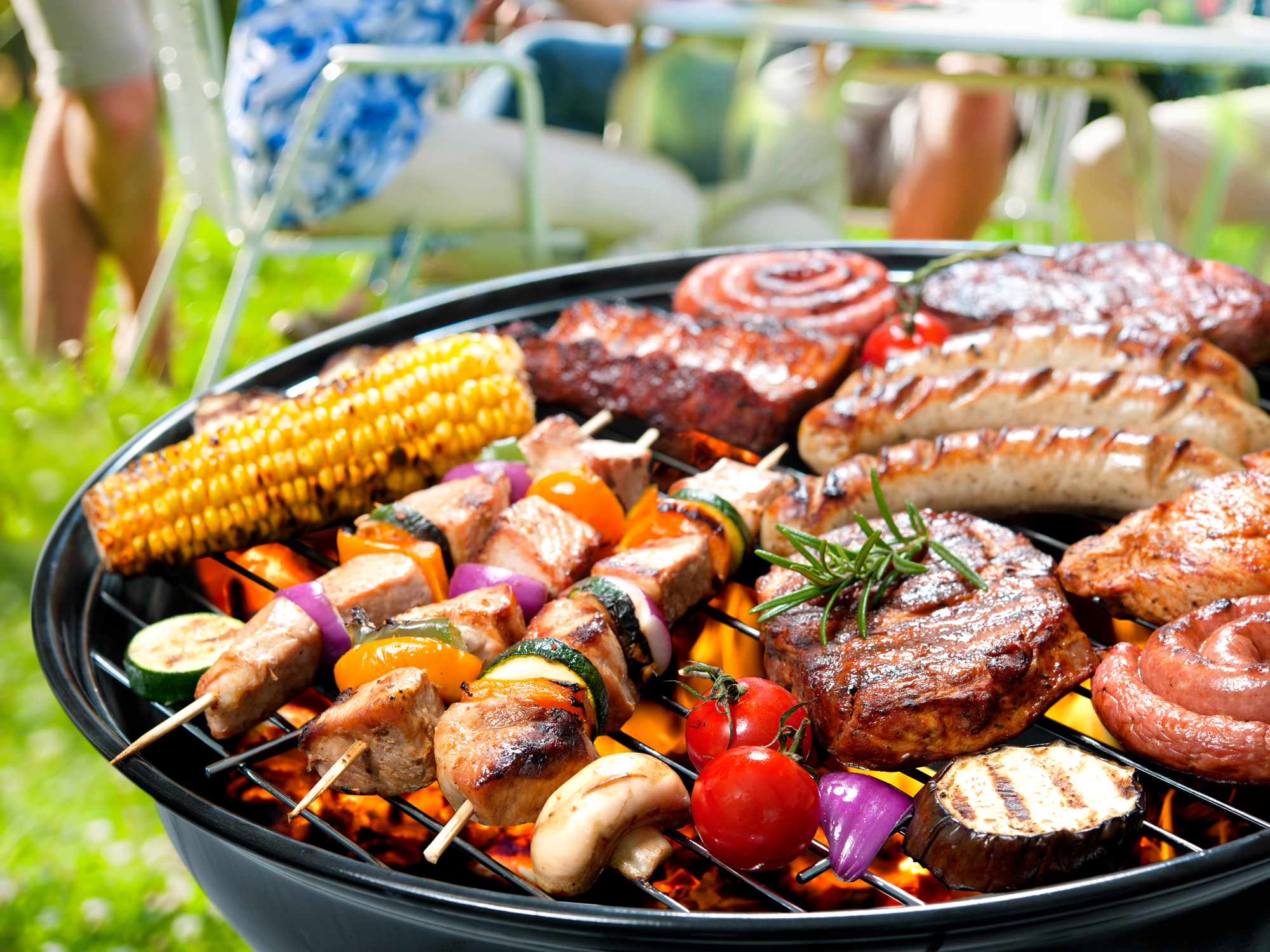Get Easy Health Digest™ in your inbox and don’t miss a thing when you subscribe today. Plus, get the free bonus report, Mother Nature’s Tips, Tricks and Remedies for Cholesterol, Blood Pressure & Blood Sugar as my way of saying welcome to the community!
9 steps that make summer grilling healthier

Got the meats? Check! The charcoal? Check! The grill? Check!
And cancer?
Sorry, but it’s true. Grilling meat can generate carcinogens.
That’s probably the last thing you want to hear right now… right when grilling season is getting started.
But don’t give up grilling just yet. There are steps you can take to drastically reduce or even eliminate the carcinogens in your barbecue.
You can also add some savory ingredients to your grilling that are powerful anti-cancer agents.
Why grilling can be hazardous to your health
Two carcinogenic substances are the direct result of grilling meat:
- Heterocyclic amines (HCAs) form when amino acids, sugars and creatine (found in muscle) react as meat is cooked at very high temperatures.
- Polycyclic aromatic hydrocarbons (PAHs) are in the smoke from your barbecue grill. When fat and juices from your meat drip into the flames, PAH-filled smoke rises and sticks to your meat, giving it a dose of carcinogens along with its smoky flavor.
Research has shown that exposure to HCAs and PAHs can cause cancer in animal subjects including tumors of the colon, liver, breast, skin, lung and prostate.
How to minimize your risk of exposure
The good news is that there are quite a few steps you can take before, during and after cooking to reduce your exposure to these deadly chemicals while still enjoying a delicious barbecue meal.
1. Use marinades.
According to J. Scott Smith, a professor of food chemistry at Kansas State University, “cooking meats with natural antioxidants decreases or eliminates HCAs on meat.” Smith found that a marinade with rosemary and thyme produced an 87 percent decrease in HCA levels.
Basil, mint, turmeric, garlic and oregano are other antioxidant herbs that taste great in marinades.
Marinades containing vinegar and/or lemon can act as an invisible shield, changing the acidity of your meat and preventing PAHs from sticking. On the other hand, thick barbecue sauces with sugar just add to the problem and should be used only toward the end of cooking.
2. Add alcohol.
In your marinades, that is. One study at the University of Porto in Portugal showed that beef marinated in red wine for six hours before grilling had 40 percent fewer carcinogens than meat that isn’t marinaded. And red wine is full of antioxidants, which soak into your meat and make it even healthier.
Or consider marinating in beer. The University of Porto study also found that marinating pork in beer for four hours before charcoal grilling reduced PAHs by as much as 53 percent (using black ale). Even non-alcoholic beer caused a 25 percent reduction in PAHs.
3. Buy lean cuts.
Less fat dripping into the flames means less PAH production. Cut off as much excess fat as possible before grilling.
4. Partially pre-cook your meat.
Pre-cooking helps cut down on carcinogens. Microwave leaner cuts for 60 seconds or thicker steaks for 90 seconds before placing on the grill. This reduces grilling time and lets some juices drain beforehand rather than dripping into the flames.
5. Control your temperature.
HCAs begin to form at 325 degrees F., while federal safety guidelines put minimum cooking temperatures for meats far below that. Use a meat thermometer to monitor cooking temperature.
If you have several burners on your grill, you can grill meat quickly on each side and then move it away from a direct flame, allowing it to cook more slowly at a lower temperature.
6. Use propane, not charcoal.
Charcoal-grilled meats contain more carcinogens. Also, charcoal makes more smoke and hotter flames.
7. Skewer it.
A great way to reduce cooking time is to place meat, chicken and vegetables on skewers. Smaller surface area means less time needed to cook and less chance to produce chemical-filled smoke.
8. Eat your veggies.
Speaking of vegetables, let’s not forget that even you meat-lovers out there can enjoy grilled vegetables! They have no amino acids, sugars or creatine to produce those unwanted carcinogens! (Fruits are healthy, too!)
Some great fruits and veggies to grill include:
- Tomatoes
- Mushrooms
- Pineapple
- Onions
- Bell peppers
- Zucchini
- Eggplant
- Mango
- Apple
- Pear
9. Don’t forget fish!
Finally, consider eating more fish and less meat this summer. Just as protein-filled and satisfying, fish has omega-3s for a healthy heart and no risk of carcinogens. Try grilling trout, salmon or snapper with some fresh tarragon, rosemary or basil. Heavenly!
Editor’s note: Did you know that when you take your body from acid to alkaline you can boost your energy, lose weight, soothe digestion, avoid illness and achieve wellness? Click here to discover The Alkaline Secret to Ultimate Vitality and revive your life today!
Sources:
- Effects of marinating with Asian marinades or western barbecue sauce on PhIP and MeIQx formation in barbecued beef — Nutrition and Cancer
- Occurrence of heterocyclic amines in cooked meat products — Meat Science
- Safe Minimum Cooking Temperatures — FoodSafety.gov
- Chemicals in Meat Cooked at High Temperatures and Cancer Risk — National Cancer Institute
- Brush On The Marinade, Hold Off The Cancerous Compounds — University of Arkansas, Food Safety Consortium
- Effect of Beer Marinades on Formation of Polycyclic Aromatic Hydrocarbons in Charcoal-Grilled Pork — Journal of Agricultural and Food Chemistry












